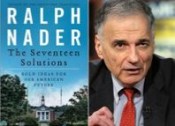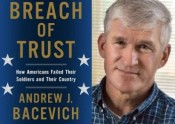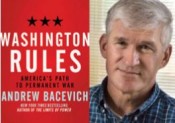ANDREW BACEVICH-How US Squandered Its Cold War Victory – Paving the Way for Trump
Written on January 23rd, 2020In his newest book, The Age of Illusions, ANDREW BACEVICH takes us from 1989’s seemingly ultimate victory in the Cold War to the current troubling and chaotic moment. He attempts to explain how we ended up with outsized inequality, permanent war, moral confusion, an increasingly angry and alienated population, and Donald Trump. We also talk about current events including the confrontation with Iran.
www.quincyinst.org
Free Forum Q&A – ANDREW BACEVICH U.S. Army, Colonel, Ret.(after 23 years) who lost his son in Iraq WASHINGTON RULES: America’s Path to Permanent War
Written on June 26th, 2015
Originally Aired August 2010
President Obama’s recent decision to add an additional 450 American soldiers to our 3,000 strong train-and-equip mission in Iraq made me reach for a dose of ANDREW BACEVICH, a voice of sanity on issues of war and peace. Bacevich wrote of Obama’s move in an op-ed, Washington in Wonderland: Down the Iraq Rabbit Hole (Again).
In WASHINGTON RULES, the 2010 book we talk about in this interview, Bacevich (in his own words) “..aims to take stock of conventional wisdom in its most influential and enduring form, namely the package of assumptions, habits, and precepts that have defined the tradition of statecraft to which the United States has adhered since the end of World War II — the era of global dominance now drawing to a close. This postwar tradition combines two components, each one so deeply embedded in the American collective consciousness as to have all but disappeared from view.
The first component specifies norms according to which the international order ought to work and charges the United States with responsibility for enforcing those norms. Call this the American Credo — …to lead, save, liberate, and ultimately transform the world.
…With regard to means, that tradition has emphasized activism over example, hard power over soft, and coercion (often styled ‘negotiating from a position of strength”) over suasion. Above all, the exercise of global leadership as prescribed by the credo obliges the United States to maintain military capabilities staggeringly in excess of those required by self-defense.”
RALPH NADER, The Seventeen Solutions: Bold Ideas for a New America
Written on January 22nd, 2015 |
Aired 10/14/12
I’ll be talking with NADER about the critical ideas in his wonderful new book, THE 17 SOLUTIONS: Bold Ideas for Our American Future. Learn more about RALPH NADER and SEVENTEEN SOLUTIONS at http://nader.org/
Some of the 17 solutions:
* Reforming the tax system
* Making our communities more self-reliant
* Reclaiming science and technology for the people
* Getting corporations off welfare
* Creating national charters for large corporations
* Reducing our bloated military budget
* Organizing congressional watchdog groups
* Enlisting the enlightened super-rich
* Use government procurement to spur innovation
RALPH NADER was recently named by the Atlantic as one of the 100 most influential figures in American history, one of only four living people to be so honored. The son of immigrants from Lebanon, he has launched two major presidential campaigns and founded or organized more than one hundred civic organizations. His groups have made an impact on tax reform, atomic power regulation, the tobacco industry, clean air and water, food safety, access to health care, civil rights, congressional ethics, and much more. He is the author of eleven books, including UNSAFE AT ANY SPEED; THE GOOD FIGHT; THE SEVENTEEN TRADITIONS; and his latest, THE SEVENTEEN SOLUTIONS: BOLD IDEAS FOR OUR AMERICAN FUTURE.
Free Forum Q&A- ANDREW BACEVICH, author of BREACH OF TRUST: How Americans Failed Their Soldiers and Their Country
Written on October 7th, 2013
 |
Aired: 10/06/13
Aired: 10/06/13
What do you feel when at sporting events or other public gatherings crowds join in a call to “support the troops?” If you’re like me, I always have some misgivings. On the simplest level, the gesture seems pretty meaningless. What am I or anyone else in that crowd actually doing to support the troops? And when they add some clichéd phrases about fighting for our freedoms, a voice in my head always asks, “Yeah, how? Where?” In Iraq, Afghanistan, operating a drone that’s flying over Pakistan or Yemen?
Today’s guest ANDREW BACEVICH has thought long and hard about such things, and has written a series of fairly short, very readable books that pursue questions that too many ignore or pretend don’t matter.
The United States has been “at war” for more than a decade. Yet as war has become normalized, a gap has widened between America’s soldiers and the society in whose name they fight. For ordinary citizens, as former secretary of defense Robert Gates has acknowledged, armed conflict has become an “abstraction” and military service “something for other people to do.”
In his latest book, BREACH OF TRUST, Bacevich takes stock of the separation between Americans and their military, tracing its origins to the Vietnam era and exploring its implications, which include a nation with an appetite for war waged at enormous expense by a volunteer army and a huge number of privatecontractors unable to achieve victory.
Q&A: Mark Mykleby, Natl Security=Sustainability
Written on April 8th, 2013 |
Aired: 04/07/13
In the preface to an article entitled A National Strategic Narrative, Anne-Marie Slaughter of Princeton says we need a narrative that confronts some of the following questions, “Where is the United States going in the world? How can we get there? What are the guiding stars that will illuminate the path along the way? We need a story with a beginning, middle, and projected happy ending that will transcend our political divisions, orient us as a nation, and give us both a common direction and the confidence and commitment to get to our destination.” She also writes, “In one sentence, the strategic narrative of the United States in the 21st century is that we want to become the strongest competitor and most influential player in a deeply inter-connected global system, which requires that we invest less in defense and more in sustainable prosperity and the tools of effective global engagement.”
Over time, the best way to shape the force of the future is to invest in the science, technology, education, and training that will equip our soldiers, sailors, airmen, and marines to adapt to an increasingly complex and dynamic environment. The hardware and software we buy and build are secondary to the gray matter we must cultivate now.
When I hear that someone high up in the military is talking seriously about sustainability, I take notice.
www.newamerica.net

